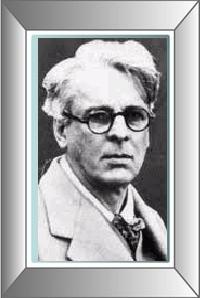Perscribo Publishing
presents
The Wild Swans at Coole

By
THIS book is, in part, a reprint of The Wild Swans at Coole, printed a year ago on my sister's hand-press at Dundrum, Co. Dublin. I have not, however, reprinted a play which may be a part of a book of new plays suggested by the dance plays of Japan, and I have added a number of new poems. Michael Robartes and John Aherne, whose names occur in one or other of these, are characters in some stories I wrote years ago, who have once again become a part of the phantasmagoria through which I can alone express my convictions about the world. I have the fancy that I read the name John Aherne among those of men prosecuted for making a disturbance at the first production of "The Play Boy," which may account for his animosity to myself.
W. B. Y.
BALLYLEE, CO. GALWAY,
September 1918.
IN MEMORY OF MAJOR ROBERT GREGORY
AN IRISH AIRMAN FORSEES HIS DEATH
THE DOUBLE VISION OF MICHAEL ROBARTES
ONE had a lovely face, |
And two or three had charm, |
But charm and face were in vain |
Because the mountain grass |
Cannot but keep the form |
Where the mountain hare has lain. |
OF THE MIND |
HANDS, do what you're bid; |
Bring the balloon of the mind |
That bellies and drags in the wind |
Into its narrow shed. |
AT KYLE-NA-GNO |
COME play with me; |
Why should you run |
Through the shaking tree |
As though I'd a gun |
To strike you dead? |
When all I would do |
Is to scratch your head |
And let you go. |
II |
CERTAIN ARTISTS BRING HER |
DOLLS AND DRAWINGS |
Bring where our Beauty lies |
A new modelled doll, or drawing, |
With a friend's or an enemy's |
Features, or maybe showing |
Her features when a tress |
Of dull red hair was flowing |
Over some silken dress |
Cut in the Turkish fashion, |
Or it may be like a boy's. |
We have given the world our passion |
We have naught for death but toys. |
III |
SHE TURNS THE DOLLS' |
FACES TO THE WALL |
Because to-day is some religious festival |
They had a priest say Mass, and even the Japanese, |
Heel up and weight on toe, must face the wall |
—Pedant in passion, learned in old courtesies, |
Vehement and witty she had seemed—; the Venetian lady |
Who had seemed to glide to some intrigue in her red shoes, |
Her domino, her panniered skirt copied from Longhi; |
The meditative critic; all are on their toes, |
Even our Beauty with her Turkish trousers on. |
Because the priest must have like every dog his day |
Or keep us all awake with baying at the moon, |
We and our dolls being but the world were best away. |
IV |
THE END OF DAY |
She is playing like a child |
And penance is the play, |
Fantastical and wild |
Because the end of day |
Shows her that some one soon |
Will come from the house, and say— |
Though play is but half-done— |
'Come in and leave the play.'— |
V |
HER RACE |
She has not grown uncivil |
As narrow natures would |
And called the pleasures evil |
Happier days thought good; |
She knows herself a woman |
No red and white of a face, |
Or rank, raised from a common |
Unreckonable race; |
And how should her heart fail her |
Or sickness break her will |
With her dead brother's valour |
For an example still. |
VI |
HER COURAGE |
When her soul flies to the predestined dancing-place |
(I have no speech but symbol, the pagan speech I made |
Amid the dreams of youth) let her come face to face, |
While wondering still to be a shade, with Grania's shade |
All but the perils of the woodland flight forgot |
That made her Dermuid dear, and some old cardinal |
Pacing with half-closed eyelids in a sunny spot |
Who had murmured of Giorgione at his latest breath— |
Aye and Achilles, Timor, Babar, Barhaim, all |
Who have lived in joy and laughed into the face of Death. |
VII |
HER FRIENDS BRING HER |
A CHRISTMAS TREE |
Pardon, great enemy, |
Without an angry thought |
WVve carried in our tree, |
And here and there have bought |
Till all the boughs are gay, |
And she may look from the bed |
On pretty things that may |
Please a fantastic head. |
Give her a little grace, |
What if a laughing eye |
Have looked into your face— |
It is about to die. |